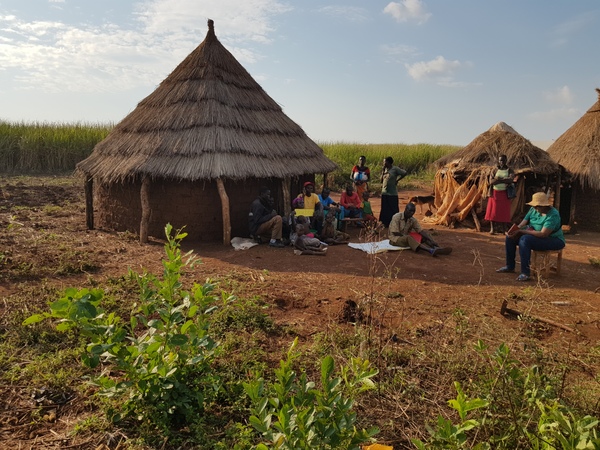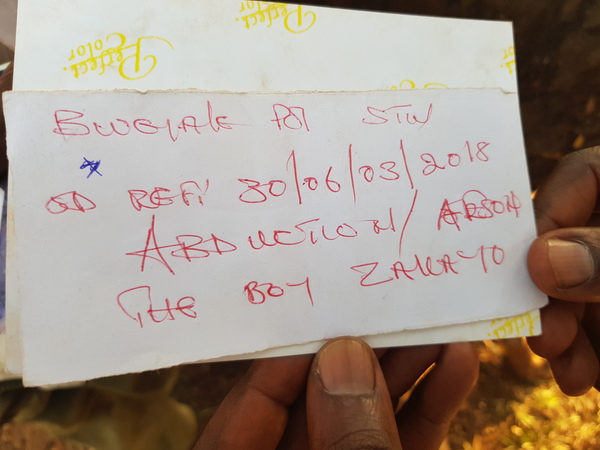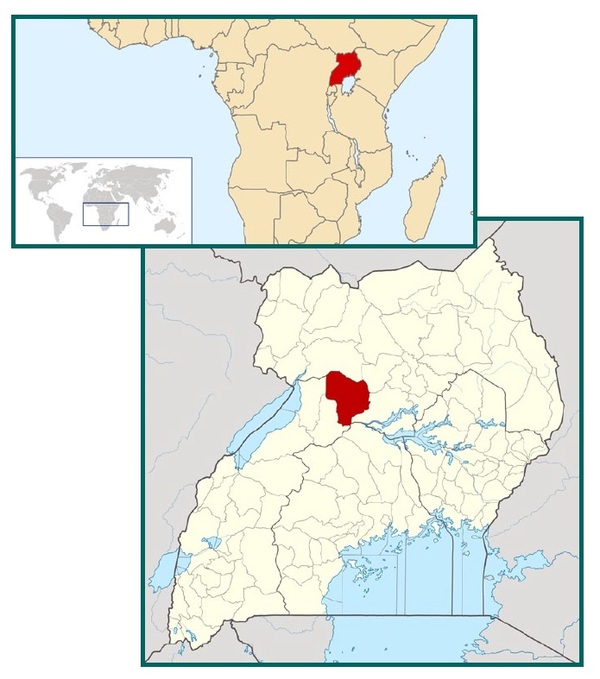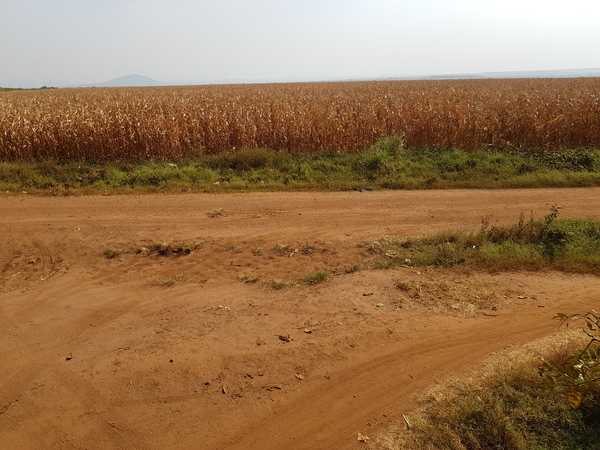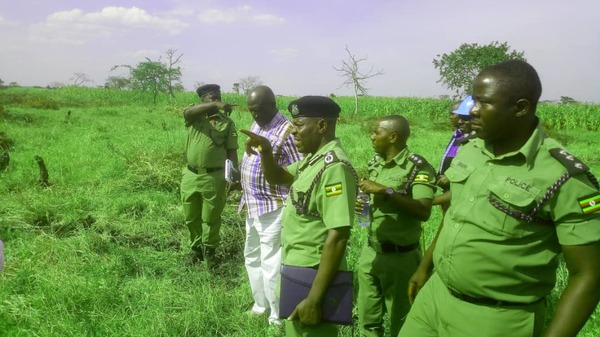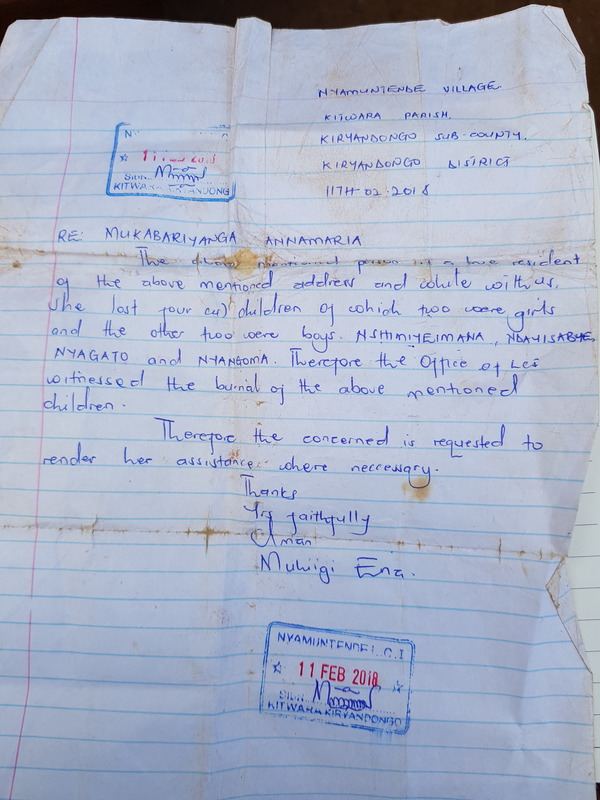Raped off their land: hallowing tales of Kiryandongo evictees
MUST
read:
When the Uganda Neo-liberal state that is premised on the policy of development induced displacements pretends to care for poor Ugandans in Mubende: State House Anti-corruption unit headed by President Museveni’s military assistant Lt. Col. Edith Nakalema arrests Asian businessman Abid Alam for destroying property and injuring people during the ill fated eviction that saw the gang rape of a woman
When ministers of Satan are used by the devil
to prevent people from being born again: Devil anointed Prophet Samuel Kakande
of Synagogue church of all nations Uganda buys acres of land belonging to the
poor: Poor Peasants in Nabyewanga, on Masaka road resist being evicted by
Prophet Samuel Kakande
When Museveni’s neo-liberal banditry state helps Occultists to grab land: Police silent as Cultist and False Prophet Pastor Michael Mukhono aka Musayi beats people, grabs land
Uganda’s Deputy Minister of Lands Ida Nantaba sued by a Dutch Coffee firm for halting the eviction of 43 poor families
Germany Investor Evicts over 400 poor Ugandan families - Mubende: Evictees struggle to get access to justice and land
http://www.fian.org/cases/cases2/mubende-uganda-coffee-plantation-by-neumann
Stealing The Land Of The Poor Ugandans For The Sake Of Neo-Liberalism: Oxfam And Uganda Land Alliance Face Deregistration Over Exposing Museveni’s Land Grab Schemes
How The World Bank Destroys the Local Economy: REPORT UNCOVERS WORLD BANK FUNDED LAND GRAB IN UGANDA
http://watchmanafrica.blogspot.com/2012/07/how-world-bank-destroys-local-economy.html
The depravity of Rich Elites in Uganda: Gold in Mubende: 270 families evicted
Land grabs at gunpoint: Thousands of families are being violently evicted from their farms to make way for foreign-owned plantations in Kiryandongo, Uganda
Share this article
Houses in the middle of the sugarcane plantation. Photo credit: Witness Radio
Three multinational companies –
Agilis Partners, Kiryandongo Sugar Limited and Great Season SMC Limited
– are involved in grabbing land, violently evicting people from their
homes and causing untold humiliation and grief to thousands of farming
families residing in Kiryandongo district, Uganda. The land grabs are
happening on abandoned national ranches, which have long since been
settled and farmed by people who came to the area fleeing war and
natural calamities in neighbouring areas. The local people are being
displaced without notice, alternatives or even negotiations and are now
desperately trying to save their homes and lives.
Sarah
Apio is a resident of Kikungulu, Kitwara parish, in Uganda’s
Kiryandongo district. She and her husband, Olupot James, live with their
nine children within an area of land known as "Ranch 28". On 1st
January 2017, Kiryandongo Sugar Company Limited told the people living
within Ranch 28 and three other "ranches" that it had acquired the lands
and that they would have to go.
Apio's family
is one of a few that still remain but their home is now completely
surrounded by a sugarcane plantation and they no longer have land to
grow foods on. Apio must "trespass" through the plantation just to
access water. When she does, she's at the mercy of the company's
security guards who have already made several attempts to rape her
daughter.
Hunger is constant in her family, and, recently, when it became unbearable, Apio said she had little choice but to take some sugarcane from the plantation for food.
"Ever since we ate the
sugarcane with my children, we have so many health problems," says Apio.
"One of my children’s stomach is swelling and he has constant
headaches. Another child has shortness of breath and rashes all over the
body."
Apio’s tragic story is also that of
most Kitwara parish residents, in the Kiryandongo district, whose lives,
farms and homes have been destroyed to make way for three large-scale
agribusiness projects supported by the government..1 (Box 1: Who's behind the land grabbers?)
Box 1: Who's behind the land grabbers?
The three companies grabbing lands in Kiryandongo are Kiryandongo Sugar Limited, Great Season SMC Limited and Agilis Partners.
Kiryandongo
Sugar is owned by members of the powerful Rai family, a Kenyan-based
business group that own numerous plantation, food, metals and timber
companies in east and southern Africa.2
Over the past decade and a half, the Rai Group has become one of the
continent's largest players in the production and import of sugar.3
Several of its sugar companies are involved in land conflicts,
including the displacement of 5,000 people by Hoima Sugar Limited in
Kijayo, Uganda.4
In the Yala Swamp area of Kenya, the family is in the process of
establishing a sugar plantation on the disputed lands formerly occupied
by the US-based company Dominion Farms.5
The family’s main holding company is based in the tax haven of
Mauritius, while one of the family members listed as an owner of
Kiryandongo Sugar owns a British Virgin Islands company that is part of
the Panama Papers database.6
Very
little is known about Great Season SMC Limited. Some local people in
Kiryandongo say they have heard that it is owned by Sudanese
businessmen, based in Dubai, as a conduit for the funds of the deposed
dictator Omar al-Bashir. Company records indicate only that it is owned
by one Yasir Adam Ahmedai Abdalla.
Agilis Partners is owned by twin brothers from the US, Phillip Prinz and Benjamin Prinz.
In 2013 the brothers established Joseph Initiative, a maize trading
company that sources from a network of outgrower farmers in Masindi
District who were previously doing contract production for British
American Tobacco.7
The Joseph Initiative has received financial support from several
sources. In 2013, it received a US$1.5 million equity investment from
the Dutch billionaire De Rijcke family, via its registered charity in the UK, Dutch Oak Tree Foundation, and DOB Equity (DOB Foundation), a private equity vehicle that manages the “charitable”
investments of the De Rijcke family. In 2017, Dutch Oak Tree sold its
minority shares in Joseph Initiative to Agilis Partners, but remains
involved in the company through a loan that is due in 2022.8
In
2013, Joseph Initiative also received a $500,000 loan from the United
Nation’s Common Fund for Commodities (CFC), via the Dutch Trust Fund
arrangement set up by the Netherlands Ministry for Development
Cooperation to support CFC projects with co-financing contributions.9 And in 2014, the UK DFID funded Food Trade programme granted Joseph Initiative £981,311(US$1280,59) , under a 3-year project.10
In
2014, the Prinz brothers made a move to go beyond trading and invest in
farming. They registered another Ugandan company, Asili Farms Limited,
as a subsidiary of Agilis Partners, and established two farms: Asili
Farms Kinumi and Asili Farms Butobi. A year later they also established
another Ugandan company, which seems to be linked to an expansion to a
third farm, Drei Asili Ltd.11
The Kiryandongo farming operation is run through another subsidiary,
Agilis Ranch 20 & 21 Investment Company (Uganda) Limited.
In
2015, Asili Farms received a US$1.2 million loan from the Common Fund
for Commodities (CFC), with most of the loan (US$1 million) provided via
the OPEC Fund for International Development. The loan contract was
signed in February 2017 and a first tranche of resources was disbursed
in May 2017. The CFC says the loan was provided to “further expand
commercial farm operations”.12
Another key backer of Agilis is the UK/Swiss hedge fund Scipion Capital. It has provided Agilis with short-term trade finance facilities and with a "term-loan” that it says allowed Agilis "to acquire 6,000 hectares of land, cultivate the land and purchase new buildings and machinery".13
The
corporate structure of Agilis Partners is complex for a company engaged
merely in farming and trading grains in Uganda. According to a filing
with the US SEC, one of its companies, Agilis Partners, is registered in
the tax haven of the Cayman Islands.14
There is also Agilis Partners Holding LLC registered in the tax haven
of Delaware, US, which is the shareholder of Agilis Partners
(Luxembourg). This Luxembourg company received a US$11 million cash
injection in 2016, when it took over shares in another company
subsidiary, Agilis Partners Ltd, registered in the tax haven of the
Seychelles.
The agribusiness invasion
Kiryandongo
Sugar Limited was the first to arrive in 2017, with its large 2,400
hectare sugar cane plantation project. Company registration documents
demonstrate that the company is owned by members of the Rai family, who,
through their Mauritius-based holding company, Rai Group, own numerous
sugar companies and other forestry and agribusiness companies across
Eastern and Southern Africa. Soon after, two other companies came: Great
Season SMC Limited, a Dubai-based company reportedly owned by Sudanese
businessmen that is building a coffee plantation on 1,165 hectares, and
Agilis Partners, a company owned by US businessmen and backed by several
foreign development agencies and "social impact" investors that is
establishing a large-scale grains farm on around 3,850 hectares. An
estimated 35,000 people are being evicted to make way for these three
plantation projects.15
"They
robbed us and evicted us with guns," says 60-year-old Florence Nassaka,
a resident in Canaan village who was evicted by Agilis Partners. "What
kind of development did they bring? Do they give us some of that maize
that you see there? Try walking into that maize farm and pick just one
maize cob, see what will happen to you! It is only for the white man.
The worst thing is that the authorities in Kiryandongo did not help us
at all; they just ate the white man’s money and moved on."
Background to a land grab
The
2007-8 global food and financial crises triggered a rush for farmland
in Africa. Since then, African governments have signed hundreds of deals
with foreign companies for agribusiness projects covering over 10
million hectares of land. The impacts on local communities have been
brutal. They have lost their lands, forests and water sources and have
suffered violent repression, food insecurity and all kinds of social
ills.16
Much
of the land that governments and companies have seized is occupied by
communities with little legal or political capacity to resist, such as
migrant communities. For example, in 2010, the Government of Tanzania
offered lands to the US agribusiness company AgriSol that over 160,000
refugees from Burundi had occupied and cultivated for nearly 40 years.17
For similar reasons, governments and companies have targeted lands
previously allocated as concessions that were abandoned or never
developed by the concession holders. Although these lands have since
been reoccupied and cultivated by local communities, governments and
companies have used the old concession contracts as a basis to sell the
lands on to new companies. There are numerous instances where this has
transpired with old oil palm plantation concessions in West and Central
Africa.18 In Kiryandongo District, in the west of Uganda, both of these factors are at work. (Box 2: Kiryandongo district).
Box 2: Kiryandongo district
Kiryandongo
district is located in western Uganda, approximately 225 kilometers
from Uganda’s capital, Kampala. It was established in July 2010 after it
was demarcated off of Masindi district. The district extends across
3,624 km2, of which 1,747 km2 are arable lands.19 The area is generally hot, but the soils and weather remain conducive to farming and livestock.
The
district is part of Bunyoro sub-region, and Runyoro is widely spoken in
the area. Other languages, however, like Luganda, Swahili, Runyankore,
Lugisu and English are also widely spoken. The variety of languages
spoken is testimony to Kiryandongo’s diverse population and the history
of migration to the area.
Many of the families that now live in Kiryandongo are descendants of families that came to the area in the 1930s for farming.
"I
was born here on 25 February 1942 and raised here by the late mzee
Kamiri Kajura. My siblings and I have been staying here since
childhood," says 78-year-old Bakaikara Edward, a resident of Kakoba
village, Kitwala Sub County in Kiryandongo district who is currently
facing eviction by Kiryandongo Sugar Limited.20
"We cultivated and lived on 400 hectares as a family, composed of my
father's seven wives and 29 children. By the time he died in 1995, we
had established families, commercial farming and a strong bond to the
land. Before my father died, he carved 200 hectares out of his land and
transferred it to me when I married my first wife. I settled on this
piece and developed it. As a farmer, I planted maize, cassava and all
forms of food crops both for home and for sale."
Over
the years, more people, fleeing war and natural calamities, came to
settle in the area from other parts of Uganda and even neighbouring
countries. There are Acholi, Masaaba, Kenyan Luos, Congolese and South
Sudanese Dinkas, Kuku, Nuer, Kakwa, Madi, and Siluk.
Joseph
Walekula is one of many people who came to Kiryandongo because of
landslides in their home area of Mbale, in Bududa District, Uganda. He
settled in the district in 2012 and was accommodated by a family that
had lived on the land for more than 40 years.
"Most
of us moved from Bududa because of the landslides. For some, they were
relocated by the government and given land. I, on other hand, moved on
my own and missed out on government land allocations in Kiryandongo,"
says Joseph. "I moved to Kiryandongo and hustled and worked hard to make
a new home for myself. There are still many problems of land and mud
slides in Bududa."
But the lands of Kiryandongo
have not only been of interest to small farmers. In the late 1970s,
then president Idi Amin Dada declared about 3,800 hectares in
Kiryandongo to be government land and then partitioned these lands into
ranches measuring several hundred hectares each. In 1975, the government
then granted a lease over several of the ranch lands to a Ugandan
company called Sodari Livestock Enterprises. It initiated some cattle
and sheep raising, but, when war erupted in the country in 1979, the
company abandoned the project and went out of business.
Many
local people, some of whose families have lived in the area since the
1930s, were not even aware that a lease to their lands had been given to
Sodari. Isingoma David, an 83-year old resident of Kisaranda
sub-county, who lives and farms on an area of land that he inherited
from his father and that is within what is now known as Ranch 21B, says
he only heard about Sodari’s lease through a rumour in 2013.
Others,
who were displaced by Sodari's operations, were moved to an area along
the River Nile that Sodari claimed to have set aside for them as part of
its lease agreement. "The owner said he had 1,165 hectares available
near to the River Nile and if we could self-organise and work with him,
he would be happy for us to go and stay there," says Baryaija Benon, one
of the local residents who was moved to the resettlement area.
For
several years after Sodari left, the lands it occupied laid bare.
Forests and bushes grew, and people eventually started moving on to the
lands to clear them for agriculture. Many families were even resettled
in the area by the government between 1995 - 1998, under a Ranches
Restructuring Scheme, and they formed an organisation called Nyamalebe
Farmers’ Association – now known as Umoja Farmers’ Association. Through
this association they applied to formalise their stay on the land and
followed the legal government procedure.
"We started at the Local Council (LC) 1 offices and made our way through all the LCs and the Resident District Commissioner (RDC) [the president’s representative at the district] and we got all the papers and they also agreed with us that we should stay on this land," says Joseph Walekula, who is the chairman of Umoja Farmers’ Association. "We took the papers to the then Minister of Lands, Aida Nantaba and she also wrote to us a letter informing us that they were coming to Kiryandongo. Then, Minister Nantaba made an arrangement and brought a team from the different ministries that were concerned with our matter… They came to all the ranches and held meetings in 3 places: Kabong, Kapapula and Kimogola. With them, they had representatives from Forestry, RDCs area MPs, Local Council Five (LC5), people from environment, lands and the Attorney General’s office. They came to the conclusion that the people on the land were there lawfully. They wrote the report and brought those documents back to us that allowed us to stay on the land until the government made its decision. At the government level, we don’t know what happened after that."
That was in 2013.
Yet, while the Umoja farmers waited for the government’s response on
their formal land claims, they and the neighbouring communities in
Kiryandongo were unaware that other actors were conspiring to take the
lands from them. Little did they know that a deal for a large part of
their lands was in the midst of being signed with Kiryandongo Sugar. Or
that Sodari, a company that had abandoned its livestock project nearly
forty years ago, was in the process of transferring its lands to the US
company Agilis Partners. Or that Great Season Limited was acquiring the
resettlement lands where communities displaced by the Sodari project
were now peacefully living and farming.
Foreign companies swoop in
The
people of Kiryandongo have a long history of welcoming new settlers to
the area. So, when these three foreign companies came talking about new
agricultural projects that they were going to pursue on the lands, the
local people were at first open-minded.
"In
fact, we welcomed them, especially if they are going to bring about
development," says Joseph Walekula. "They only needed to have come in
properly, made the right arrangements, acquired land in an appropriate
manner and acknowledged the communities that they found in the ranches,
at least given us a share on the land. This should have been a win-win
situation but when these ones came, they wanted a win-lose situation,
where they were the winners and the communities the losers."
The
situation quickly soured. According to local community members, in
April 2017, Agilis Partners purchased the lands they were cultivating
without their knowledge. Those living on the lands say they only found
out about the deal several months later when the Kiryandongo district
Local Council Five Chairman (LC5) and the area Member of Parliament (MP)
held a rally at Kanani and Kapapula trading centers in October 2017.
That is when they announced to the communities that the lands belonged
to the government, that the lands had been sold to companies for
development and that the company would compensate the victims and follow
all the eviction perquisites.
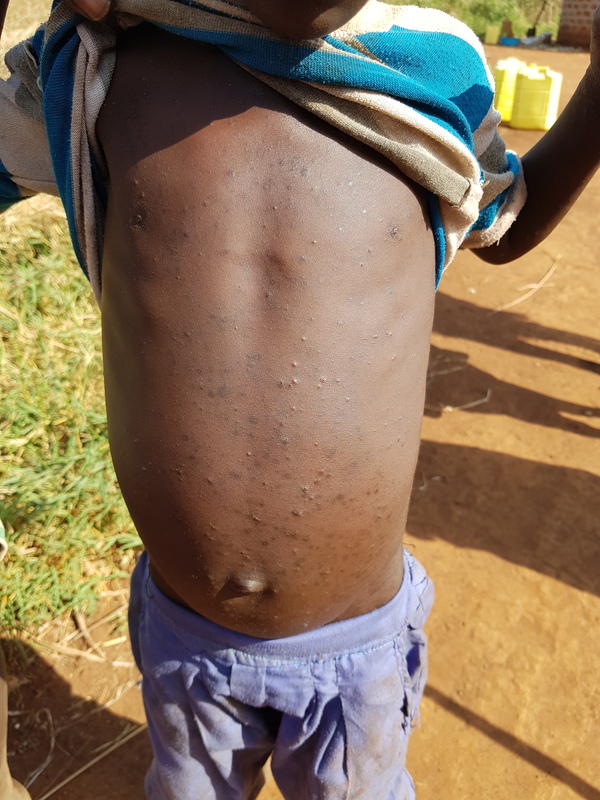
A
young boy with the allergies and infections he developed after eating
the sugarcane from Kiryandongo Sugar plantation. Photo credit : GRAIN
After
this incident, community members decided to self-organise. They began
by nominating prominent community members to lead them in finding the
truth behind the land grabs.
"We immediately launched
consultative meetings and the first office we went to was that of the
area Member of Parliament," said one of the community elders. "In that
meeting, he told us that it was true the land had been sold with no
proof (no document was shown). To that effect however, he said, the
investors would compensate for properties on the land but not for the
piece of land."
Two weeks later, after the
meeting with the Member of Parliament, information leaked that there
would be a "stakeholders’ meeting" with the investor at a hotel opposite
the Kiryandongo district headquarters. Three community leaders managed
to sneak into the meeting and in attendance were the Kiryandongo
district RDC, Kiryandongo District Police Commander (DPC), the area LC
1, LC 3, LC 5, and a white man representing the company Joseph
Initiatives who introduced himself as Phillip Prinz. According to
community members, this was the first time they saw someone from Joseph
Initiatives, which is owned by Agilis Partners.
The
community leaders present in the meeting say that Phillip Prinz
presented a road map that he claimed would lead to the development of
the land. He mentioned a number of plans including registration of all
lawful occupants, valuation, consultative meetings, compensation and
resettlement. Other pledges included training farmers in seed management
and storage, the construction of hospitals and roads and a total
investment of upwards of a billion shillings (US$275,000). Prinz
promised jobs for community members and even displayed samples of 5kg
maize flour bags that he said his company was going to provide to the
affected communities.
The three-person
delegation of community leaders at the meeting demanded to know what was
the plan for the compensation of affected community members and asked a
series of other pointed questions about the violent ways in which their
lands were being grabbed.21
Prinz is said to have responded with a promise that his company would
valuate their properties on the lands and would offer adequate
compensation to everyone. He also is said to have promised to pay an
additional UGX 500,000 (about US$ 131) for bush clearing. Community
leaders say these promises were never fulfilled.
Shortly
after, in late November 2017, the area Member of Parliament invited 10
community leaders for a meeting at the Bweyale trading center. Once at
the meeting venue, the community leaders say they received a call from
community members informing them that three police patrol cars, loaded
with 10 policemen in each vehicle had invaded their villages with a
group of about 20 men armed with pangas (machetes) and clubs to carry
out a forceful invasion of their lands.
No
sooner had the community leaders received this information than they
were surrounded by police, arrested and taken to the Bweyale police
station where they were then transferred to Kiryandongo Central Police
station, where they remained illegally detained for 10 days. They were
charged with inciting violence, malicious damage to property, arson and
aggravated robbery. While in detention, five more community leaders,
including the women representative to the Local Council 1 (LC1) Akiteng
Stella, who had protested the forceful land invasion, were also arrested
and held in police cells.
Community leaders say that once this land invasion was complete, workers from Agilis Partners, accompanied by Kiryandongo police officers, went into the communities and started intimidating and forcing individual community members at gunpoint to accept payments of as low as UGX 300,000 (about US$ 78) to leave their land.
Violent land grabs
In
early 2017, residents of Kakoba village in Kiryandongo district heard
on the radio that they were soon going to be evicted from their lands.
"I
heard notices over radio that the people should prepare to have their
lands valuated, to be compensated and to leave the eviction site," said
78-year old Bakaikara Edward, a resident of Kakoba. "The advert was run
for two months…No meeting or information was given to us pertaining to
alternative settlements, nor did they carry out public hearing and
valuations."22
Then
in March 2017 agents and workers of Kiryandongo Sugar Limited descended
on the area, accompanied by the local Member of Parliament and other
local government officials.
"They threatened me
and my 4 children with guns and said we should leave the house. I was 8
months pregnant and my husband was away. They pushed us out forcefully
and I was caned thoroughly in the back without consideration of my
pregnancy. I was thrown down by one of the evictors and continued being
beaten on the ground ," says 35-year-old Mukabariyanga Anamario, a
resident of the area of Ranch 23. "Due to the bad injury they induced on
me , I started bleeding for about 5 days but could not go to the
hospital because I did not have money. I was later on taken to
Kiryandongo Hospital by the people of the neighbouring area where I
moved to after the eviction. Unfortunately, I had a stillbirth due t o
the severe fall that I had during the eviction. My back was also badly
injured, and I still feel pain."23
Such violent repression of villagers in Kiryandongo is often done with the involvement of the Ugandan state. Witness Radio has collected evidence that soldiers from 4th Division of the Uganda People Defense Forces (UPDF), Kiryandongo police personnel and private security guards, like Saracen Uganda Limited, from outside the area are working directly with Kiryandongo Sugar, as well as Agilis Partners and Great Season, to carry out the evictions. Apart from Saracen, the companies also employ untrained and violent security guards who are armed with pangas as well as bows and arrows.
Great Season, for instance,
collaborates with a local land dealer named Reuben Mwesigwa who sold
them the land titles in the area. Although community leaders have seen
documents from the government's local Land Protection unit in Kibuli
showing that these land titles are fake, Mwesigwa has used his close
relationship with the Kiryandongo police to prevent the local residents
from challenging the company's occupation of their lands.
Community
leaders say that the police have acted on Mwesigwa's orders to
physically assault members of the community and to arbitrarily arrest
and detain community land rights defenders. According to them, the
area’s police post at Kimogola refuses to handle any complaint from
community members affected by Great Season's operations and all of their
attempts to file cases have been rejected. On 22 March 2020, Sipiriano
Baluma, a resident of Jerusalem village, was arrested and detained at
Kimogola Police Station when he tried to lodge a complaint against Great
Season regarding the destruction of his crops. He was later transferred
to Kiryandongo Police Station where he was charged with criminal
trespass and released on bond after spending 10 days in an illegal
detention centre.
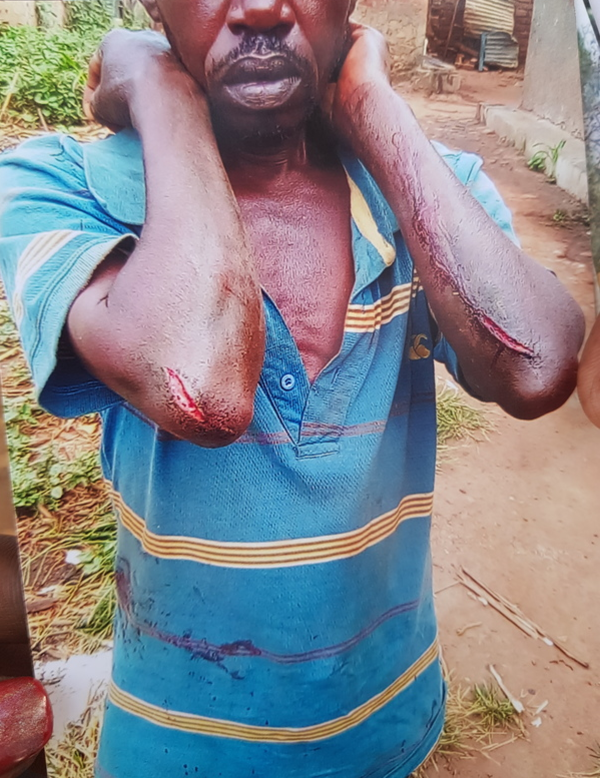
A community member who was beaten and hacked with a panga during the eviction. Photo credit: community member archives
Similarly,
on 25 March 2020, in Nyamuntende, company agents from Kiryandongo
Sugar, accompanied by four soldiers of the Uganda People’s Defence
Forces (UPDF), entered the property of land rights defender Richard
David Otyaluk with a tractor belonging to the company and ploughed up
his maize fields. When Richard David Otyaluk tried to stop the tractor
from destroying his crops, the soldiers detained and beat him. They also
beat and detained land rights defender James Olupoti who tried to
photograph the attack. Both were taken to a camp belonging to
Kiryandongo Sugar that houses workers and UPDF soldiers. There they were
tortured before being transferred to the Kiryandongo police station.
They were held there for seven days before being charged with criminal
trespass and released on bond.
Such constant violence has made residents fearful of speaking out and fighting back.
“Of
course, I fear for my dear life and reprisals if what I have said here
reaches our evictors," says Benon Baryaija, one of the former residents
of Ranch 23, where Great Season is operating. "These companies have
established a surveillance network to spy on us, on everything we do.
They have done so through buying/compromising everyone including our
fellow victims. Every time you speak out, they will look for you. If you
go and complain anywhere, you will no longer be able to sleep in your
home. As I speak to you now, I am not at my home. I tried to stay there
but I was beaten, tortured and threatened until I left it. I lost my
property to save my life."
Community
members in Jerusalem village, Kiryandongo in a meeting with Human
Rights Defenders where they share their struggle. In the background we
see the makeshift houses that their local leader has allowed them to
erect so they can have a place to stay in the short term. They are not
allowed to build permanent structures like toilets or homes. Photo
credit: GRAIN
The suffering of the people
"Our
hearts are broken. Our children are not going to school and we do not
have food. We are angry, very angry and we are hungry," says Joyce
Badudu, one of the women evicted from her lands by Kiryandongo Sugar.
Before
the agribusiness companies came in, Badudu and the other small farmers
of Kiryandongo planted beans, maize, sweet potatoes, bananas,
groundnuts, cassava and mangoes, and they kept pigs, goats and cows.
Now, large chunks of land are covered with sugarcane, coffee, soya and
maize which are all solely for export, while one of the companies,
Agilis, produces cereal for the United Nations World Food Programme.
"I
had 23 acres of land. I had a banana plantation as my biggest
investment," says another villager, Agarubanda Emmanuel. “I also farmed
maize and cassava and grew yams. I kept 60 free range chickens, 47 pigs,
and free-range ducks. I had also made a chain link fence for my pigs
and those chains are still there although the fence was destroyed."
Food
was once plentiful in the area, and the people produced surpluses that
were even sold in the markets of Kampala. But now hunger and
malnourishment stalk the communities. Without lands to farm, the local
people have had to turn to work on the plantations. Kobusingye Jane, a
former resident of Ranch 23, says her husband died from the shock and
distress of being evicted from their home. With 12 children to raise and
educate on her own, she has no choice but to work as a casual labourer
on the Kiryandongo Sugar plantation where she is paid about US$0.50 for a
day’s work.
“Those people working in sugarcane
are really suffering. They are living like slaves. We often wonder if
these companies come to impoverish Ugandans," says Joseph Walekula. "We
asked one police officer at the time that we were jailed why he was
torturing fellow Ugandans. He told us that they want us to suffer and
live on the streets. It feels like the government and these investors
are just set out to torture ordinary Ugandans.”
The
health of the workers and local people are also impacted by the heavy
use of agrochemicals on the plantations as well as the burning of
sugarcane. Local residents say that nothing is done to protect them or
forewarn them when crops are being sprayed or being burned. The effects
of these chemicals are visible on the bodies and compromised health of
the children and women. Residents also say that the plantations have
also greatly increased the population of mosquitos in the area. Yet, the
companies have not set up medical clinics to care for the workers and
local people impacted by their operations. Moreover, several local
schools have closed because the children can no longer access them.
Schools that have been destroyed so far:
Drug shops that have been destroyed:
|
Pushed to the brink
Communities
are doing their best to fight for their dignity and for their lives to
be restored despite the threats and intimidation they face. In the case
of Agilis Partners, they have tried, with the support of some national
and international organisations, to pressure those foreign governments
and companies that support and finance the company. In February 2020,
they addressed an open letter and a petition to the ambassadors of the
United Kingdom, United States and Netherlands in Uganda as well as the
government of Uganda to stop the evictions and address this land grab.24
Agilis did issue a public response, but little has changed on the
ground, and the various governments have remained totally silent.25
The
communities are also trying to seek justice in court. With the support
of a human rights defense organisation – Witness Radio – and their
lawyers (M/S Kiiza & Mugisha Advocates), the communities have filed
several cases in the Masindi high court to try and block the evictions.
The cases are currently pending hearing dates.
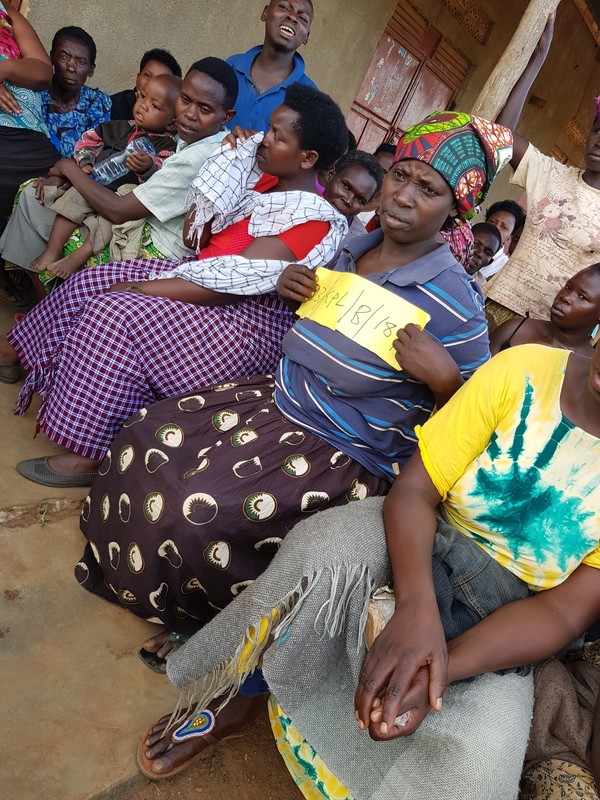
During
an emotionally charged women's meeting, woman shows the compensation
claim form (yellow paper) that she has kept for years with hope of
compensation. Photo credit: GRAIN
The lawyers have also faced their own persecution from the authorities. On 30t
June, 2020, seven lawyers – Nafula Elizabeth, Kaijuka Ezron, Tuwayenga
Brian, Buryelali Joan, Muhindo Morgan, Koloa Eric and Marunga Christine
commissioned by Kiiza & Mugisha Advocates to collect evidence – were
detained following orders from the Kiryandongo District Police
Commander Bakaleke Joseph with close supervision of the Agilis Manager
on the charge of carrying out a “negligent act likely to spread
infection of disease”.
“We were born in Uganda
but Uganda has changed. We don’t know if our leaders love and care for
the white people more than they care about their own citizens. I don’t
know where they rate us as Ugandans," says Florence Nassaka. "If you try
and step on that land, they will arrest you because you stepped on the
white man’s land."
It is a sentiment echoed by
fellow community leader Benon Baryaija. “This is why we do not feel like
Ugandans. You cannot stay in the middle of a soybean, sugarcane or
coffee plantation. We are now walking around aimlessly in a country that
is supposed to be ours.”
ACKNOWLEDGEMENT
Thanks to the Environmental Defenders Legal Centre and Kiiza & Mugisha Advocates
for their help with this report.
_____________________________
1
The information presented in this report is based primarily on witness
testimonies and other evidence collected through numerous visits to
Kiryandongo and through regular communications with community leaders by
Witness Radio since June 2018, as well as a series of interviews
conducted by GRAIN and Witness Radio with community members and leaders
in Kiryandongo in March 2020.
2 "The Immortals: From timber, the Rai family became billionaires," The Nairobian, May 2016:
3The
Rai Group's sugar holdings include Hoima Sugar Limited and Kinyara
Sugar in Uganda and West Kenya Sugar Company, Kabras Sugar, and Sukari
Industries in Kenya. A large plantation project is also in the works in
Kenya's Yala Swamp and in Rwanda. See: "Rai family, the empire that
decides how sweet your tea is," Daily Nation, 18 March 2020: https://www.nation.co.ke/news/Rai-family—the-empire-that-decides-how-sweet-your-tea-is/1056-4623146-qhb1kn/index.html; "Rai Group sugar project worth $300m yet to be approved," East African, 28 January 2018: https://www.theeastafrican.co.ke/rwanda/Business/Rai-Group-sugar-project-yet-to-be-approved/1433224-4281960-gx4o79/index.html; "Fresh dispute rocks planned Yala swamp takeover," The Nation, 28 January 2020: https://farmlandgrab.org/29435.
4Albertine Watch, "The community in Kijayo evicted by Hoima Sugar Limited drinking polluted water," 22 May 2019: https://www.albertinewatchdog.org/2019/05/22/the-community-in-kijayo-evicted-by-hoima-sugar-limited-drinking-polluted-water/
5"Fresh dispute rocks planned Yala swamp takeover," The Nation, 28 January 2020: https://farmlandgrab.org/29435
6Guljait Kaur Rai is listed as a shareholder of BVI-based Beachcraft Properties Limited:
7
"Tobacco estates turned into cereal plantations," Uganda Monitor, 9
July 2018:
https://www.monitor.co.ug/Business/Tobacco-estates-turned-cereal-plantations/688322-4653172-view-printVersion-13kf2qsz/index.html
8 "DOB Equity sells shares in Joseph Initiative", AVCA, 12 September 2017: https://www.avca-africa.org/newsroom/member-news/2017/dob-equity-sells-shares-in-joseph-initiative/
9 Annual Report Common Fund for Commodities 2018 (p.50): https://issuu.com/symsign/docs/cfc_ar_2018
10 ITAD, "FoodTrade East and Southern Africa Mid-Term Evaluation, Final Report," February 2017: http://iati.dfid.gov.uk/iati_documents/45206889.pdf
11Asili
Farms appears to have received backing from the Swiss impact investor
Alphamundi. See the promotional video produced by Asili Farms and
Alphamundi on the Asili Farms operations, "Asili Farms AlphaMinute,"
December 2016: https://www.youtube.com/watch?v=ibC9AhaFXkg
12 Annual Report of the CFC, 2018: https://issuu.com/symsign/docs/cfc_ar_2018
13See this post by a Scipion Capital employee in 2019 on Linkedin https://www.linkedin.com/posts/cfstorey_scipion-capital-ltd-is-working-with-the-activity-6569579259382366208-w_R_ as well as the Scipion Capital website: https://www.linkedin.com/posts/scipion-capital_ace-press-release-ugcPost-6588440529644597248-5bId. Scipion describes itself as a "financier" of Agilis here: https://www.linkedin.com/posts/scipion-capital_ace-press-release-ugcPost-6588440529644597248-5bId
14 Agilis Partners, "Response to Business & Human Rights Resource Centre," 18 May 2020: https://www.business-humanrights.org/sites/default/files/documents/Response%20to%20Business%20%26%20Human%20Rights%20Resource%20Centre%20-%2018%20May%202020.pdf
15 Bill Oketch, "35,000 left homeless as private firms share Kiryandongo land," Daily Monitor, 25 February 2020: https://farmlandgrab.org/29498
16 See AFSA, "Policy Trends and Emerging Opportunities for Strengthening Community Land Rights in Africa," November 2017: https://afsafrica.org/land-policy-report-policy-trends-and-emerging-opportunities-for-strengthening-community-land-rights-in-africa/ and GRAIN, "The global farmland grab in 2016: how big, how bad?" June 2016: https://grain.org/e/5492
17
Oakland Institute, 2012: Understanding land investment deals in Africa.
Lives on hold: The impact of Agrisol’s land deal in Tanzania. Available
at https://www.oaklandinstitute.org/iowa-company-linked-refugee-abuses-tanzania
18Alliance
Against Industrial Plantations in West and Central Africa, "Communities
in Africa fight back against the land grab for palm oil," September
2019: https://grain.org/e/6324
19
Uganda Investment Authority. Kiryandongo district investment profile.
Available at
https://www.ugandainvest.go.ug/wp-content/uploads/2019/06/UNDPUg1720-DistrictProfile_Kiryandongo.pdf
20 Excerpt from a sworn Court Affidavit, 2020.
21 Interview, March 2020: Extracted from an interview with Joseph Walekula.
22 Interview, March 2020: Excerpt from a sworn court affidavit (2020).
23 Court Affidavit, 2020: Excerpt from a sworn court affidavit.
24See
farmland.org for accounts, and particularly farmlandgrab.org, Open
letter to halt land evictions by agribusiness companies in Kiryandongo
District, 2020, https://www.farmlandgrab.org/post/view/29484
25 See "Agilis Partners' Response", Business & Human Rights, 15 April 2020: https://www.business-humanrights.org/en/agilis-partners-response
26Witness Radio, Multinationals use COVID-19 crisis to violently grab land of poor communities with impunity. https://witnessradio.org/multinationals-use-covid-19-crisis-to-violently-grab-land-of-poor-communities-with-impunity/
27 Witness Radio, "Agilis Partners/Asili Farms resort to torture to disempower and grab land from the poor," 12 May 2020: https://witnessradio.org/agilis-partnersasili-farms-resort-to-torture-to-disempower-and-grab-land-from-the-poor/
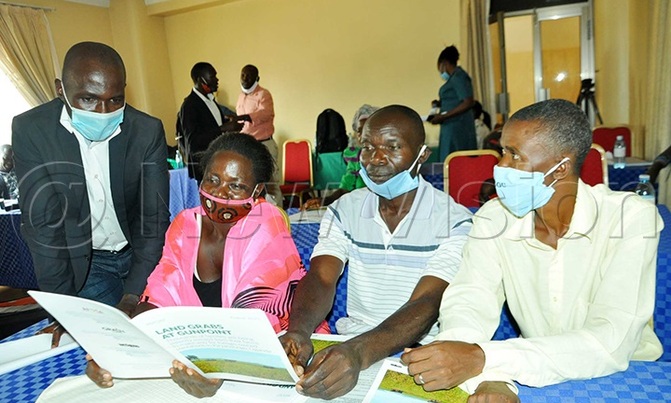
According to a report titled, ‘Land Grabs at Gunpoint', land grabbing is happening on abandoned national ranches which have for long been settled on and farmed by people who settled in these areas while fleeing war and natural calamities in neighboring areas.
The report names three multinational companies-Agilis Partners, Kiryandongo Sugar Limited and Great Season SMC Limited as being at the center of the violent evictions of people from their homes.
Agilis Partners is currently preparing the land to grow simsim (sesame), maize, sunflower, and soybean.
Kiryandongo Sugar Limited is planting and producing sugar on 2,400 hectares and Great Season is growing coffee on 1,165 hectares.
The report notes that local people from Kiryandongo are being displaced without notice, alternatives or even negotiations and are right now trying to save their homes and lives.
The report states that more than 35,000 people from over 20 villages are homeless after being evicted from about 9,300 acres of land in Kiryandongo to pave way for large scale farming.
The report and research was done by Alliance for Food Sovereignty in Africa, Witness Radio Uganda and Grain, a non-profit organization which operates in areas where thousands have been evicted and are at the verge of losing their land.
The Project Coordinator of Witness Radio Uganda, Geoffrey Wokulira said gross human rights violations have been meted out on natives by the three above investment companies.
"The companies have used law enforcement bodies and private security firms among others to forcefully evict bonafide occupants, unlawfully arrest, detain and harass the native communities," Wokulira said.
He made the remark while launching the report at Hotel Triangle in Kampala on Wednesday.
Wokulira said the negative consequences of Kiryandongo land giveaway include; "forced evictions, human rights violations, lost livelihoods, broken families, rising food insecurity and, ultimately, increased poverty."
He noted that children caught up in the fracas are no longer going to school.
"Hundreds of young girls are engaged in early marriages because ideally they have no future and there is no responsibility these companies are showing," he said.
Wokulira said over 100 people have been arrested by police in an attempt to weaken, intimidate and cause fear among the evicted residents.
The reports says that when the three companies came talking about agricultural projects, the local people were at first open minded.
"The companies only needed to have come in properly, made the right arrangements, acquired land in an appropriate manner and acknowledged the communities that they found in the ranches, at least given them a share on the land,"
Victims speak out
60-year-old Florence Nassaka, a resident of Canaan village in Kiryandongo said she was evicted by Agilis Partners.
"What kind of development did they bring? Do they give us some of the maize that you see there? Try walking into that maize farm and pick just one cob. See what will happen to you. It is only for the white man," Nassaka said.
She said the worst thing is the authorities in Kiryandongo do not help the affected at all; they just eat the white man's money and move on.
Sarah Apio, a resident of Kikungulu, Kitwara parish in Kiryandongo district said with her family of nine children and her husband James Olupot continue to live at ‘Ranch 28' but their family is one of the few that still remain but their home is completely surrounded by sugarcane plantation.
The report recommends that it's imperative for government to protect, children and all vulnerable groups whose livelihoods are constantly threatened by limited land use and access.
"African governments must stop handing out farmlands to foreign companies and start prioritizing their own people's access to land and local food systems,"
The report recommends that evictions should be stopped and villages must be fully compensated for any damages they have suffered.
The report further asserts that there's need for an independent investigation into the crimes of fraud, torture, sexual abuse, corruption and all illegal activities alleged to have occurred during eviction of communities from their homes.
Efforts to speak to officials from the three companies were fruitless as they could not pick our repeated calls.
Foreign investors responsible for land evictions-Report
https://www.newvision.co.ug/news/1525597/foreign-investors-responsible-land-evictions-report
By Abou Kisige
Added 26th August 2020 02:45 PM
More than 35,000 people from over 20 villages are homeless after
being evicted from about 9,300 acres of land in Kiryandongo to pave way
for large scale farming.

(L-R) Geoffrey Wokulira the Project Coordinator of Witness Radio
Uganda Stella Akiteng, Joseph Walekula and Benon Barya some of the
victims. Photo by Abou Kisige.
KIRYANDONGO- Foreign investors dealing in agribusiness have been blamed for the ongoing land grabbing in Kiryandongo district in Northern Uganda.
KIRYANDONGO- Foreign investors dealing in agribusiness have been blamed for the ongoing land grabbing in Kiryandongo district in Northern Uganda.
According to a report titled, ‘Land Grabs at Gunpoint', land grabbing is happening on abandoned national ranches which have for long been settled on and farmed by people who settled in these areas while fleeing war and natural calamities in neighboring areas.
The report names three multinational companies-Agilis Partners, Kiryandongo Sugar Limited and Great Season SMC Limited as being at the center of the violent evictions of people from their homes.
Agilis Partners is currently preparing the land to grow simsim (sesame), maize, sunflower, and soybean.
Kiryandongo Sugar Limited is planting and producing sugar on 2,400 hectares and Great Season is growing coffee on 1,165 hectares.
The report notes that local people from Kiryandongo are being displaced without notice, alternatives or even negotiations and are right now trying to save their homes and lives.
The report states that more than 35,000 people from over 20 villages are homeless after being evicted from about 9,300 acres of land in Kiryandongo to pave way for large scale farming.
The report and research was done by Alliance for Food Sovereignty in Africa, Witness Radio Uganda and Grain, a non-profit organization which operates in areas where thousands have been evicted and are at the verge of losing their land.
The Project Coordinator of Witness Radio Uganda, Geoffrey Wokulira said gross human rights violations have been meted out on natives by the three above investment companies.
"The companies have used law enforcement bodies and private security firms among others to forcefully evict bonafide occupants, unlawfully arrest, detain and harass the native communities," Wokulira said.
He made the remark while launching the report at Hotel Triangle in Kampala on Wednesday.
Wokulira said the negative consequences of Kiryandongo land giveaway include; "forced evictions, human rights violations, lost livelihoods, broken families, rising food insecurity and, ultimately, increased poverty."
He noted that children caught up in the fracas are no longer going to school.
"Hundreds of young girls are engaged in early marriages because ideally they have no future and there is no responsibility these companies are showing," he said.
Wokulira said over 100 people have been arrested by police in an attempt to weaken, intimidate and cause fear among the evicted residents.
The reports says that when the three companies came talking about agricultural projects, the local people were at first open minded.
"The companies only needed to have come in properly, made the right arrangements, acquired land in an appropriate manner and acknowledged the communities that they found in the ranches, at least given them a share on the land,"
Victims speak out
60-year-old Florence Nassaka, a resident of Canaan village in Kiryandongo said she was evicted by Agilis Partners.
"What kind of development did they bring? Do they give us some of the maize that you see there? Try walking into that maize farm and pick just one cob. See what will happen to you. It is only for the white man," Nassaka said.
She said the worst thing is the authorities in Kiryandongo do not help the affected at all; they just eat the white man's money and move on.
Sarah Apio, a resident of Kikungulu, Kitwara parish in Kiryandongo district said with her family of nine children and her husband James Olupot continue to live at ‘Ranch 28' but their family is one of the few that still remain but their home is completely surrounded by sugarcane plantation.
The report recommends that it's imperative for government to protect, children and all vulnerable groups whose livelihoods are constantly threatened by limited land use and access.
"African governments must stop handing out farmlands to foreign companies and start prioritizing their own people's access to land and local food systems,"
The report recommends that evictions should be stopped and villages must be fully compensated for any damages they have suffered.
The report further asserts that there's need for an independent investigation into the crimes of fraud, torture, sexual abuse, corruption and all illegal activities alleged to have occurred during eviction of communities from their homes.
Efforts to speak to officials from the three companies were fruitless as they could not pick our repeated calls.

